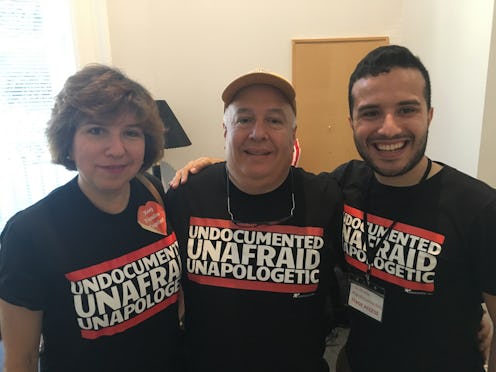
Juan Escalante will never forget the moment he found out he was eligible for the Deferred Action for Childhood Arrivals Program (DACA), the Obama administration program that has shielded hundreds of thousands of undocumented immigrants who came to the country as children from deportation since it was instituted in 2012.
Escalante, 28, a 2011 Florida State University graduate and organizer for the non-profit organization America's Voice, recalls how he saw chatter building on Twitter about how Obama was planning to make an announcement on immigration reform.
"I turned on the TV and watched and my mouth just dropped," Escalante, who came to the United States from Venezuela with his family when he was 11 years old, says with a laugh. "I remember running outside and calling my mom and being a little hysterical because I just couldn't contain my emotions. I was excited. I was happy. I knew it [DACA] would be something that would provide me that next step."
Five years later, more than 780,000 young people across the United States, known as DREAMers, have received DACA protection — and with it, a second chance at life in the country they consider to be their homes.
During his campaign, Donald Trump said he would end the DACA program, but on Thursday night, the White House released memorandum announcing DREAMers could, at least for now, remain in the United States.
While DACA has impacted their lives in myriad ways — financially, socially, legally — one of the less talked about areas is the positive effect it has had on recipients' mental health. According to a study by the National UnDACAmented Research Project, the program has also significantly bolstered recipients' overall mental health and well-being.
According to the study, DREAMers experience an increase in educational and economic opportunities, generally perform better in jobs and are less fearful of living in this country.
"DACA has provided a massive sense of hope and direction for people who, frankly, were used to having doors always closed in their faces," Tom Jawetz, the Vice President of Immigration Policy at the Center for American Progress, tells Bustle. "It doesn't provide permanent reassurances, but it does provide a formal recognition of your presence and an opportunity to, in many places, get a driver's license, potentially get in-state tuition, and by requiring that people go back to school, it provides an incentive for individuals to get back to education."
"There's this feeling of 'otherness' that I used to live with and this feeling of being different," she says. "Now, I can apply to almost any job that I set my mind to."
Yunuen Alvarado, 19, a DACA recipient and sophomore at Texas State University, says that she struggled with her mental health prior to joining the program at the age of 15.
"It's just a constant fear," she says of being undocumented. "We've done everything we've been asked to do. We go to school. We work. We follow the law just like everybody else."
Since becoming a DREAMer, Alvarado, who came to the United States from Mexico when she was six years old, says she was able to secure an on-campus job, get her driver's license, and pursue higher education. Her goal is to eventually go to law school and work as a pro bono immigration lawyer to help people like her who have faced similar challenges.
"There's this feeling of 'otherness' that I used to live with and this feeling of being different," she says. "Now, I can apply to almost any job that I set my mind to."
While the Trump administration is permitting DREAMers to stay in the country for now, their long-term status remains unclear. Not for nothing do some feel uneasy. Since Trump took office, there have been some notable cases of DACA recipients facing the threat of deportation, like when 21-year-old Emmanuel Ayala Frutos of Oregon was detained by federal immigration agents in March while he was in the middle of renewing his DACA. Moreover, hours before it was announced DREAMers could stay, the Trump administration ended protections for undocumented immigrant parents who have children of American citizenship.
"I think for some young people who have had DACA for three or four years, there is the fear of uncertainty that this administration is creating," Jawetz says.
Sill Jawetz hopes that DREAMers are more adept at coping with potential stresses and fears under Trump because of what they've gained under the program. "These are individuals who have, with the help of DACA, gained agency in their lives and are better equipped to handle the uncertainties of these times," he says.
Since receiving his DACA status, Escalante says he returned to school for his master's degree, pursued a career in immigration advocacy, and, above all, felt a renewed sense of purpose.
"What the DACA program did was rejuvenate the hopes of a lot of individuals who, perhaps, had doubts of their abilities or their futures in this country," he says. "For the DACA program to grant you the ability of not having to constantly go to bed in fear is definitely something that was life-changing and continues to be a ray of hope in these difficult times for immigrants."